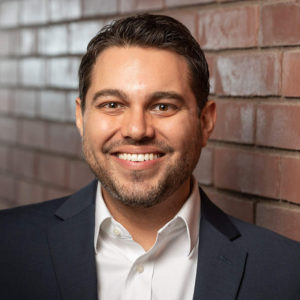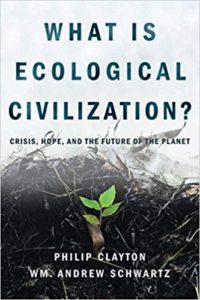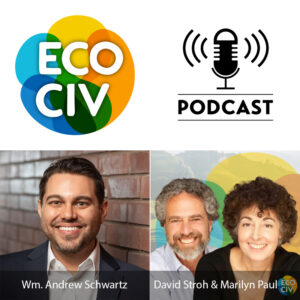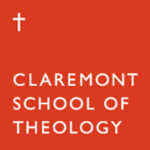
ABOUT
_____________________
Dr. Wm. Andrew Schwartz is an American philosopher and activist. He currently serves as Executive Director of the Center for Process Studies (CPS), Co-Founder & Vice President of the Institute for Ecological Civilization (EcoCiv), and Associate Professor of Process Studies and Comparative Philosophy at Claremont School of Theology (CST). His research and teaching covers a wide range of topics, such as environmental philosophy, philosophy of religion, Asian and comparative philosophies, metaphysics, economic philosophy, philosophy of mind, philosophy of education, and more. However, his current work mainly focuses on the role of big ideas in bringing about systems change for the long-term wellbeing of people and the planet (i.e. ecological civilization).
RECENT PUBLICATIONS
_____________________
WHAT IS ECOLOGICAL CIVILIZATION?: CRISIS, HOPE, AND THE FUTURE OF THE PLANET
 This book explores the idea of ecological civilization by asking eight key questions about it and drawing answers from relational philosophies, the ecological sciences, systems thinking and network theory, and the world’s religious and spiritual traditions. It concludes that a genuinely ecological civilization is not a utopian ideal, but a practical way to live. To recognize this, and to begin to take steps to establish it, is the foundation for realistic hope.
This book explores the idea of ecological civilization by asking eight key questions about it and drawing answers from relational philosophies, the ecological sciences, systems thinking and network theory, and the world’s religious and spiritual traditions. It concludes that a genuinely ecological civilization is not a utopian ideal, but a practical way to live. To recognize this, and to begin to take steps to establish it, is the foundation for realistic hope.
VIDEOS
_____________________
Andrew Schwartz gives a plenary address on "Learning from Living Systems: Biomimicry and the Principles of Ecological Civilization" at the 17th International Forum on Ecological Civilization at Pitzer College.
PODCASTS
_____________________
Listen to podcast recordings featuring Dr. Schwartz on a range of topics.
COURSES
_____________________
Indian Philosophies in Process: Hinduism, Jainism, and Buddhism (Spring 2025)
The Indian subcontinent is home to some of the most elaborate and important philosophical traditions in the world. This course will survey the major systems of philosophy that have developed in India, from antiquity to the present (including Vedic philosophies, Jainism, Buddhism, and interactions amongst all of these schools); placing them in conversation with the core ideas of process philosophy. Themes covered will include: the fundamental nature of reality, theories of knowledge, ideas of the good life, and more.
Models of God & Ultimate Realities (Spring 2025)
This course offers an in-depth examination of various conceptions of God and ultimate realities across religious and philosophical traditions. From classical theism, pantheism, panentheism, monism, and more, students will engage in a comparative analysis of key questions about the nature of existence, the role of the divine in the cosmos, and what it means for human beings to relate to the ultimate.

